 System Tutorial
System Tutorial
 Windows Series
Windows Series
 How to Fix the \'No Audio Output Device Is Installed\' Error on Windows 11
How to Fix the \'No Audio Output Device Is Installed\' Error on Windows 11
How to Fix the \'No Audio Output Device Is Installed\' Error on Windows 11
Have you encountered the "No Audio Output Device Is Installed" error while unmuting audio via the system tray? If so, your audio output device could be unplugged or disabled, the audio drivers could be outdated, or the audio services could be turned off. Here are some solutions you can try.
1. Perform Some Preliminary Checks
Start the troubleshooting process by applying some basic fixes. First, restart your computer to fix any minor glitches that may be causing the issue. If you use external speakers or headphones as your primary audio output device, check that they are correctly plugged into your computer. Also, unplug and then plug them back in to your system.
Ensure you haven't mistakenly plugged your audio output device into the microphone jack. If you have multiple audio output devices connected simultaneously, unplug all except your primary device. Also, carefully clean the headphone jack or speaker port and try connecting your audio device to another port to rule out a problem with the port itself.
Additionally, uninstall any audio customization applications you might be using. If none of these basic checks help resolve the issue, apply the remaining fixes.
2. Run the Audio Troubleshooter
Windows comes with an audio troubleshooter that can help identify the primary cause of audio issues and help you fix them. If the above basic checks don't solve the problem, try running the audio troubleshooter. Right-click the Start button, open "Settings," and go to Troubleshoot > Other Troubleshooters.
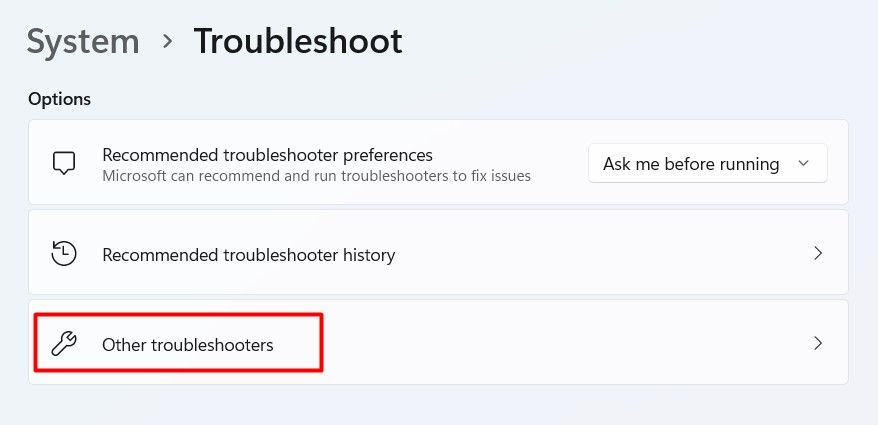
Click on the "Run" button next to Audio, and it will open the Get Help app, where you need to follow the on-screen instructions to help Windows diagnose the problem for you.
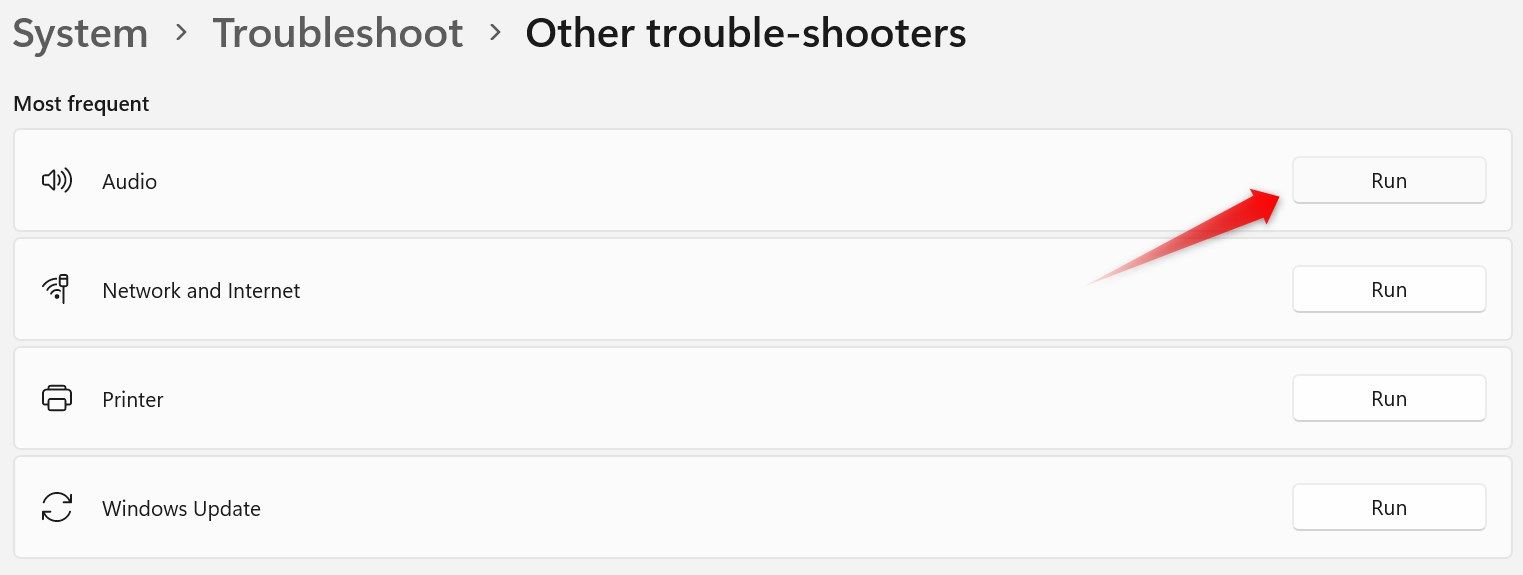
If the audio troubleshooter fails to detect the problem, try our remaining fixes to manually fix the problem.
3. Ensure the Audio Output Device Isn't Disabled
You may encounter the "No Audio Output Device Is Installed" error if the audio output device is disabled in the sound settings. To ensure that's not the case, right-click the Start button and open "Settings." Then, navigate to System > Sound, and click "More Sound Settings" under Advanced.
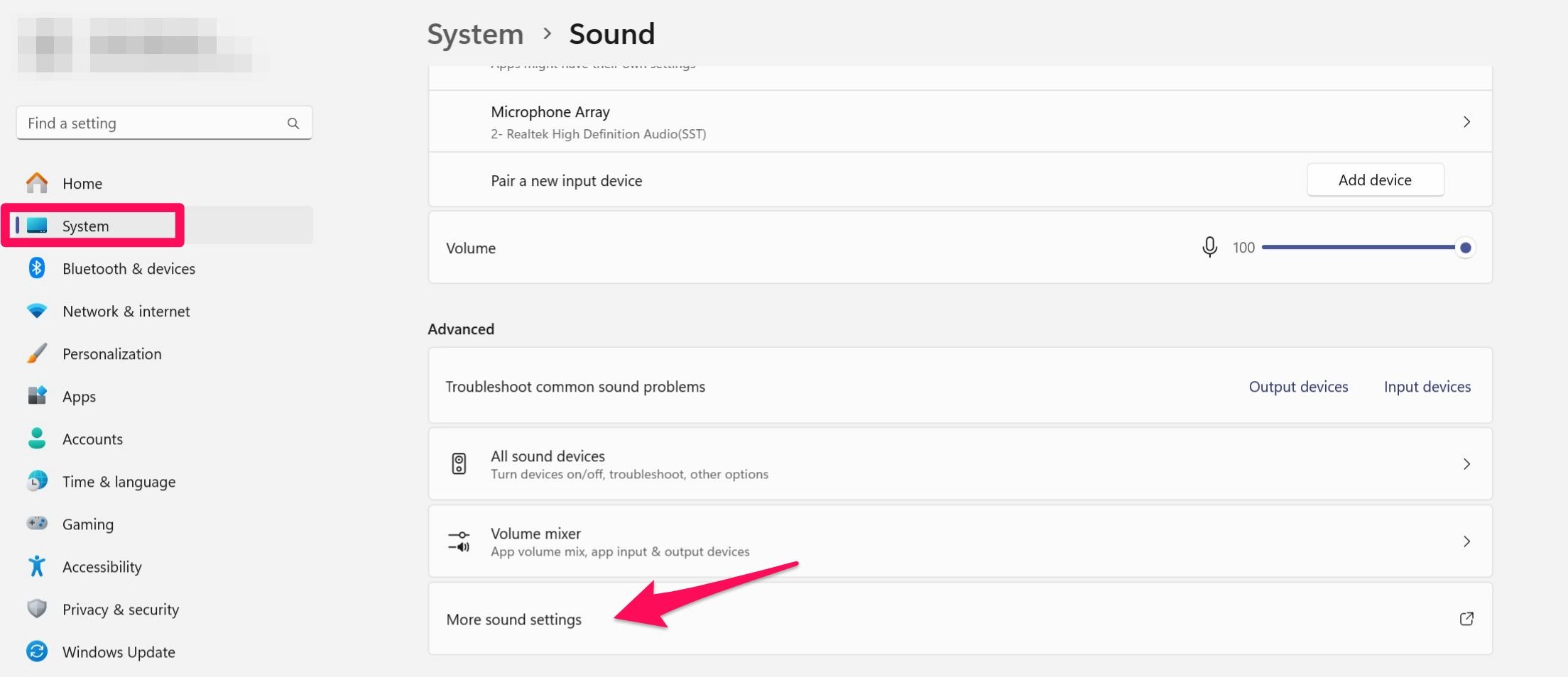
Then, go to the "Playback" tab. If you find all audio output devices disabled here, you should enable the primary playback device. To do so, right-click on it and select "Enable."
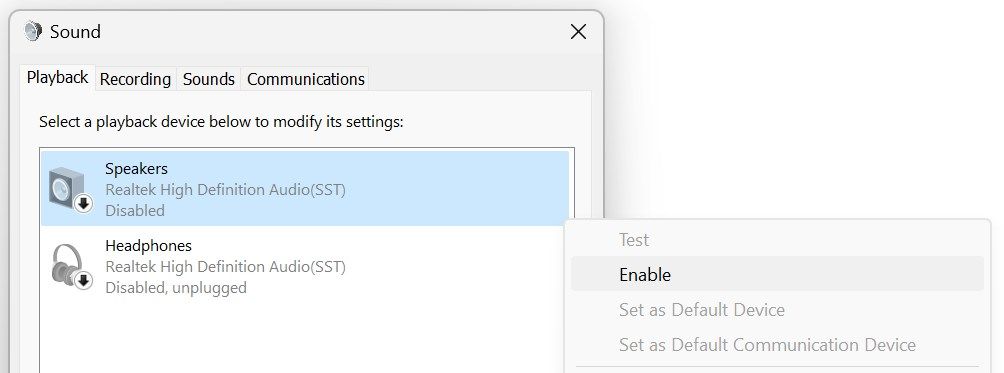
4. Enable the Audio Output Device From Device Manager
If you don't see any device listed in the playback tab of sound settings, the audio output devices may be disabled in Device Manager. To ensure that's not the case, right-click the Start button and open "Device Manager." Then, expand the "Sound, Video, and Game Controllers" category.
If you see a downward arrow on the audio device, it indicates that it's disabled. To rectify this, right-click on it and select "Enable Device."
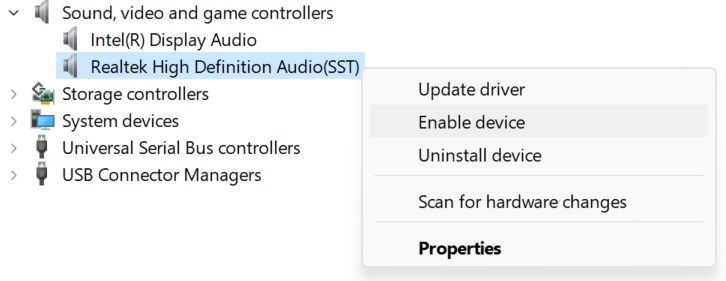
5. Turn On the Audio Services
If the audio output devices seem enabled in Device Manager but aren't visible in the playback devices, the audio services could be disabled. To rule out this possibility, type Services in Windows Search and open the "Services" app. Locate the "Windows Audio" and "Windows Audio Endpoint Builder" services.
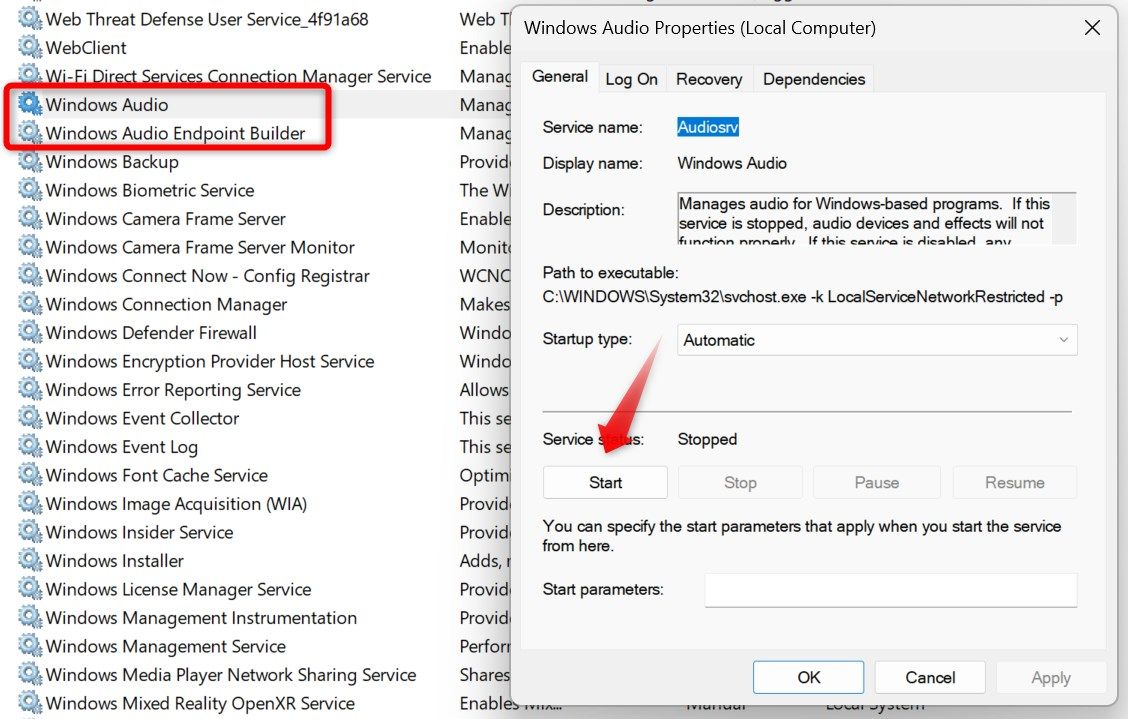
Double-click on each service, one after the other. If you find the Service Status as "Stopped," click the "Start" button to enable them.
6. Enable or Disable Chipset Audio From BIOS
If you don't see the entire "Sound, Video, and Game Controllers" category in Device Manager, the chipset audio might be turned off in BIOS. So, you need to enable it in BIOS or UEFI settings. To enter the BIOS, open the Settings app, go to System > Recovery, and click "Restart Now" next to Advanced Startup.

Before restarting your computer, you'll be prompted to save your work. Save it, then click the "Restart Now" button in the confirmation popup. Your device will boot directly into the "Choose an Option" screen. From here, go to Troubleshoot > Advanced Options > UEFI Firmware Settings, and click "Restart."
The process to enable or disable onboard audio will vary depending on your laptop or motherboard manufacturer and the model you're using. If you're unable to find it, refer to the manufacturer's documentation. Using that information, locate the onboard audio option; if it's disabled, turn it back on.
If you've installed a new sound card or sound adapter and encountered the error afterward, consider turning off the onboard audio to rule out any conflict between the cards.
7. Reinstall the Default Audio Drivers
Having corrupted or outdated audio drivers is another common cause of this error. To ensure that's not the case, you should uninstall and reinstall them. Right-click on the Start button, open "Device Manager," expand the "Sound, Video, and Game Controllers" category, then right-click on the audio driver, and select "Uninstall Device."
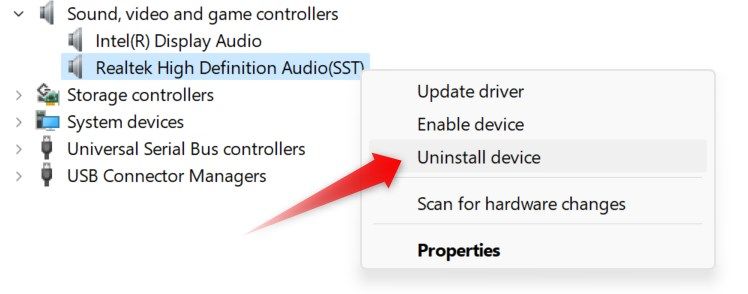
After uninstalling the drivers, restart your computer. Windows will automatically reinstall them from scratch, which may help resolve the problem.
8. Install Manufacturer-Specific Audio Drivers
If you're unable to use a specific audio output device on your computer, you may need to install the manufacturer's drivers. To rule out this possibility, go to the manufacturer's website and download the latest audio drivers available. Most manufacturer-specific audio drivers come in an executable format, so you may only need to run the driver file to install it.
If installing the manufacturer-specific audio drivers also fails to restore audio on your computer, ensure you don't have any pending system updates that need to be installed.
9. Check for System Updates
If none of the above fixes work, ensure your system is fully up-to-date. Right-click on the Start button and open "Settings." Navigate to the "Windows Update" tab on the left. If your system is fully up-to-date, you'll see a message stating, "You're Up to Date." You can also click the "Check for Updates" button to search for available updates.
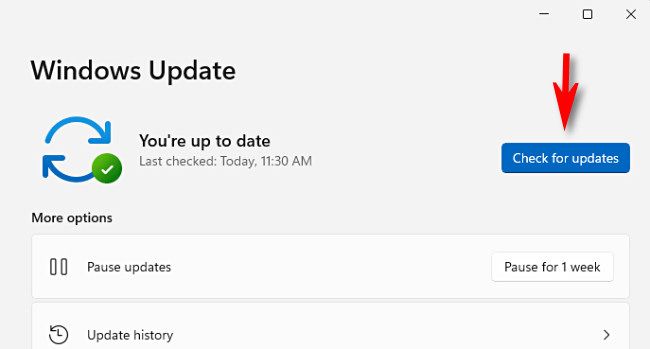
Windows will then search for any available updates, download them, and proceed to install them.
Hopefully, the above troubleshooting steps will help you identify the primary cause of the "No Audio Output Device Is Installed" error and fix it to enable audio on your system. If the issue persists, and you only have one sound card installed, ensure it hasn't become faulty and requires replacement. Consider seeking professional help to rule out this possibility.
The above is the detailed content of How to Fix the \'No Audio Output Device Is Installed\' Error on Windows 11. For more information, please follow other related articles on the PHP Chinese website!

Hot AI Tools

Undresser.AI Undress
AI-powered app for creating realistic nude photos

AI Clothes Remover
Online AI tool for removing clothes from photos.

Undress AI Tool
Undress images for free

Clothoff.io
AI clothes remover

Video Face Swap
Swap faces in any video effortlessly with our completely free AI face swap tool!

Hot Article

Hot Tools

Notepad++7.3.1
Easy-to-use and free code editor

SublimeText3 Chinese version
Chinese version, very easy to use

Zend Studio 13.0.1
Powerful PHP integrated development environment

Dreamweaver CS6
Visual web development tools

SublimeText3 Mac version
God-level code editing software (SublimeText3)

Hot Topics
 1664
1664
 14
14
 1422
1422
 52
52
 1316
1316
 25
25
 1267
1267
 29
29
 1239
1239
 24
24
 Windows kb5054979 update information Update content list
Apr 15, 2025 pm 05:36 PM
Windows kb5054979 update information Update content list
Apr 15, 2025 pm 05:36 PM
KB5054979 is a cumulative security update released on March 27, 2025, for Windows 11 version 24H2. It targets .NET Framework versions 3.5 and 4.8.1, enhancing security and overall stability. Notably, the update addresses an issue with file and directory operations on UNC shares using System.IO APIs. Two installation methods are provided: one through Windows Settings by checking for updates under Windows Update, and the other via a manual download from the Microsoft Update Catalog.
 Nanoleaf Wants to Change How You Charge Your Tech
Apr 17, 2025 am 01:03 AM
Nanoleaf Wants to Change How You Charge Your Tech
Apr 17, 2025 am 01:03 AM
Nanoleaf's Pegboard Desk Dock: A Stylish and Functional Desk Organizer Tired of the same old charging setup? Nanoleaf's new Pegboard Desk Dock offers a stylish and functional alternative. This multifunctional desk accessory boasts 32 full-color RGB
 ASUS' ROG Zephyrus G14 OLED Gaming Laptop Is $300 Off
Apr 16, 2025 am 03:01 AM
ASUS' ROG Zephyrus G14 OLED Gaming Laptop Is $300 Off
Apr 16, 2025 am 03:01 AM
ASUS ROG Zephyrus G14 Esports Laptop Special Offer! Buy ASUS ROG Zephyrus G14 Esports Laptop now and enjoy a $300 offer! Original price is $1999, current price is only $1699! Enjoy immersive gaming experience anytime, anywhere, or use it as a reliable portable workstation. Best Buy currently offers offers on this 2024 14-inch ASUS ROG Zephyrus G14 e-sports laptop. Its powerful configuration and performance are impressive. This ASUS ROG Zephyrus G14 e-sports laptop costs 16 on Best Buy
 Got an AMD CPU and Aren't Using PBO? You're Missing Out
Apr 12, 2025 pm 09:02 PM
Got an AMD CPU and Aren't Using PBO? You're Missing Out
Apr 12, 2025 pm 09:02 PM
Unlocking Ryzen's Potential: A Simple Guide to Precision Boost Overdrive (PBO) Overclocking your new PC can seem daunting. While performance gains might feel elusive, leaving potential untapped is even less appealing. Fortunately, AMD Ryzen processo
 How to Use Windows 11 as a Bluetooth Audio Receiver
Apr 15, 2025 am 03:01 AM
How to Use Windows 11 as a Bluetooth Audio Receiver
Apr 15, 2025 am 03:01 AM
Turn your Windows 11 PC into a Bluetooth speaker and enjoy your favorite music from your phone! This guide shows you how to easily connect your iPhone or Android device to your computer for audio playback. Step 1: Pair Your Bluetooth Device First, pa
 5 Hidden Windows Features You Should Be Using
Apr 16, 2025 am 12:57 AM
5 Hidden Windows Features You Should Be Using
Apr 16, 2025 am 12:57 AM
Unlock Hidden Windows Features for a Smoother Experience! Discover surprisingly useful Windows functionalities that can significantly enhance your computing experience. Even seasoned Windows users might find some new tricks here. Dynamic Lock: Auto
 Microsoft Might Finally Fix Windows 11's Start Menu
Apr 10, 2025 pm 12:07 PM
Microsoft Might Finally Fix Windows 11's Start Menu
Apr 10, 2025 pm 12:07 PM
Windows 11's Start Menu Gets a Much-Needed Overhaul Microsoft's Windows 11 Start menu, initially criticized for its less-than-intuitive app access, is undergoing a significant redesign. Early testing reveals a vastly improved user experience. The up
 You Can Get The Razer Basilisk V3 Pro Mouse for 39% off
Apr 09, 2025 am 03:01 AM
You Can Get The Razer Basilisk V3 Pro Mouse for 39% off
Apr 09, 2025 am 03:01 AM
##### Razer Basilisk V3 Pro: High-performance wireless gaming mouse The Razer Basilisk V3 Pro is a high-performance wireless gaming mouse with high customization (11 programmable buttons, Chroma RGB) and versatile connectivity. It has excellent sensors, durable switches and extra long battery life. If you are a gamer looking for a high-quality wireless mouse and need excellent customization options, now is a great time to buy the Razer Basilisk V3 Pro. The promotion cuts prices by 39% and has limited promotion periods. This mouse is larger, 5.11 inches long and 2 inches wide



